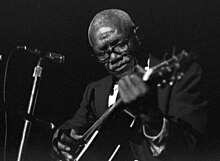Furry Lewis
Furry Lewis | |
|---|---|
Universal |
Walter E. "Furry" Lewis (March 6, 1893
Life and career
Lewis was born in
In his travels as a musician, he was exposed to a wide variety of performers, including Bessie Smith, Blind Lemon Jefferson, and Alger "Texas" Alexander. In 1916,[a] Lewis lost a leg in an accident when trying to jump a freight train in the area around Du Quoin, Illinois, despite having enough cash to pay for a rail ticket.[3] He spent a month in hospital at Carbondale, Illinois recovering, although it took him a year to adjust to his artificial leg and in the meantime he gave up his traveling lifestyle and returned to Memphis, where he performed on street corners.[3] In 1922 he took a permanent position as a street sweeper for the city of Memphis, a job he held until his retirement in 1966, which allowed him to continue performing music in Memphis.
Lewis made his first

On October 3, 1959,
In July 1968, Bob West recorded Furry Lewis along with Bukka White in Lewis's Memphis apartment. In 1972, West, with Bob Graf, in Seattle, released the recording on a 12-inch vinyl record.[6] In 2001 the recording was released on CD as "Furry Lewis, Bukka White & Friends, Party! at Home", by Arcola Records.[7]
In 1969, the record producer
In 1972, he was the featured performer in the Memphis Blues Caravan, which included Bukka White, Sleepy John Estes, Clarence Nelson, Hammie Nixon, Memphis Piano Red, Sam Chatmon, and Mose Vinson.[citation needed]
He opened twice for the
Lewis began to lose his eyesight because of cataracts in his final years. He contracted pneumonia in 1981, which led to his death from heart failure in Memphis on September 14 of that year at age 88.[8] He is buried in the Hollywood Cemetery in South Memphis, where his grave bears two headstones. The second, larger headstone, was purchased by fans.[3]
Discography
- Furry Lewis, 1959
- Back on My Feet Again, 1961
- Done Changed My Mind, 1962
- Fourth & Beale, 1969
- Live at the Gaslight at the Au Go Go, 1971
- Shake 'Em On Down (compilation), 1972
- The Alabama State Troupers Road Show, 1973
Notes
References
- ^ a b c d Eder, Bruce (1981). "Furry Lewis: Biography". AllMusic.com. Retrieved August 30, 2015.
- ^ ISBN 978-0313344237.
- ^ a b c d [1] Archived January 4, 2006, at the Wayback Machine"Furry Lewis", by Greg Johnson - Article Reprint from the July 2001 BluesNotes, via Cascade Blues Association
- ISBN 1-85868-255-X.
- ^ ISBN 1-85868-255-X.
- ^ "popsike.com - SCARCE BLUES LP Furry Lewis & Bukka White ASP1 - auction details". Popsike.com. Retrieved August 23, 2018.
- ^ "Arcola Records, music cds, Traditional Jazz Blues, Furry Lewis and Friends". Arcolarecords.com. Retrieved August 23, 2018.
- ^ Doc Rock. "The 1980s". TheDeadRockStarsClub.com. Retrieved August 30, 2015.
External links
- Fansite reminiscences
- Furry Lewis at Find a Grave
- Mini-biography @ cr.nps.gov Archived February 3, 2007, at the Wayback Machine
- Furry Lewis on Myspace
- Mississippi Blues Trail
- Illustrated Furry Lewis discography
- Furry Lewis discography at Discogs
